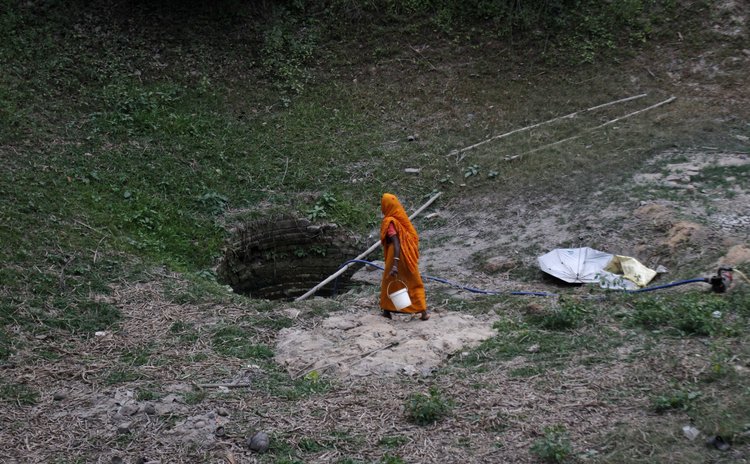Dominicans are a very strange people: We consistently pay little attention to our future

On April 22nd hundreds of millions of people around the world will observe Earth Day, the date that the United Nations has set aside for communities the world over to clean up litter, plant trees, or simply reflect on nature and to bring greater attention to climate change- one of the most urgent problems affecting our world.
But we can bet our net salaries that apart from the voice of Father Franklyn Cuffy and a few other conservationists, not much more will be heard about Earth Day in the "Nature Isle of the World", the country that has set itself the impossible target of becoming the first climate-resilient nation in the world (similar to dreaming of being the first nation to colonize Mars). Yes, we are strange people indeed.
But doubly strange is the fact that the 2021 theme for Earth Day is "Restore Our Earth" a theme that should resonate well with Dominica because we are currently trying to recover after the devastation of category five Hurricane Maria in 2017 that destroyed, not only our homes but a major part of our forest
But we should not be surprised. Dominicans have indeed become a strange people who seem to care little about important matters such as electoral reform, the quality of governance in our fledgling democracy and where do political parties, that have not held even a barbecue sale or a village raffle, get the money to stage so many lavish political rallies and buy million-dollar houses. Indeed, we are strange people.
"Restore Our Earth" should also resonate with our effort to save our species like the Mountain Chicken. In case you have forgotten, in 2002 the Dominican Mountain Chicken (Leptodactylus fallax) was a critically endangered amphibian that had to be saved from extinction due to a deadly attack from a fungal disease called the amphibian chytrid. The Mountain Chicken frog, known in Dominica as the Crapaud, was a cultural symbol that forms part of the Coat-of-Arms and is used as a logo by several very important Dominican institutions such as the National Bank of Dominica. Eighty percent of the population of the Crapaud was wiped out within 18 months. Other threats to the crapaud population included habitat destruction and hunting.
In addition, the Dominica Sea Turtle Conservation Organization (DOmSeTCO) reported recently that the Dominica Sea Turtle population is in sharp decline due to a combination of climate change, plastics and illegal hunting. Nevertheless, DOmSeTCO says that in spite of the decline "it is not too late to rescue Dominica's sea turtles but action must be taken immediately, including prosecuting those which illegally hunt the endangered species". So we do have issues pertaining to endangered species.
But as we stated in an editorial a few years ago, if Dominicans are as passionate about the environment as they say they are, why do they continue to ignore Earth Day? After all, we are the Nature Isle whose Coat of Arms proudly declares: "Apres Bondie C'est La Ter', (After God the Earth) to remind us of the importance of the soil and the environment, in other words, our earth, to the future prosperity of Dominica.
As we have also stated we are puzzled by the Government of Dominica's as well as civil society's nonchalant attitude towards other international days on the environment such as World Environment Day (observed the world over on 5 June), World Rivers Day (observed on 25 September) and World Water Day (22 March).
In the past, we have suggested that the Ministry of Tourism should make World Rivers Day, for example, one of its most important calendar events simply because more than 90% of our tourism sites depend on the state of our rivers. Undoubtedly, the Ministry of Tourism must have noticed that many of these water sources, essentially our tourism product, are dead or near death. Many environmentalists have predicted that unless the trend is reversed urgently Dominica will have few water-based tourism sites in a couple of decades. But we are strange people. Of all the notable days that we mentioned earlier, Earth Day has special significance for Dominica. Even if one argues that Earth Day is a global "feel-good gimmick" that we do not need to be part of, billions around the world believe the event can be an opportunity to ensure that the next generation does not repeat the same mistakes as their parents. Earth Day, therefore, provides a moment of reflection to acknowledge our collective missteps. Significantly, on Earth Day in December 2015 the Paris Agreement, a legally binding international treaty on climate change, was adopted by 196 Parties at COP 21 in Paris and entered into force on 4 November 2016. Its goal was to limit global warming to well below 2, preferably to 1.5 degrees Celsius. But in June 2017 the United States of President Donald Trump pulled itself out of the Agreement. Hours after being inaugurated in January 2021, President Joe Biden re-entered the United States in the Paris Agreement as he had promised to do.
In March 2021, President Biden followed up by inviting 40 world leaders to the Leaders' Summit on Climate he will host on April 22 and 23. Prime Minister Gaston Browne of Antigua and Barbuda and Prime Minister Andrew Holness of Jamaica have been invited to the virtual summit but not Dominica's prime minister who has been touted as the "leader of leaders" on climate resilience in the region. So, what is the Biden administration telling Dominicans about our dream of becoming the first climate-resilient nation in the world?
In addition, with the beginning of the 2021 hurricane season just around the corner, on June 1, bearing the threat of another Maria-type monster storm, we believe Dominicans would have been well advised to consider taking the message of Earth Day much more seriously.
But we will not, because, unfortunately, we are a very strange people.




